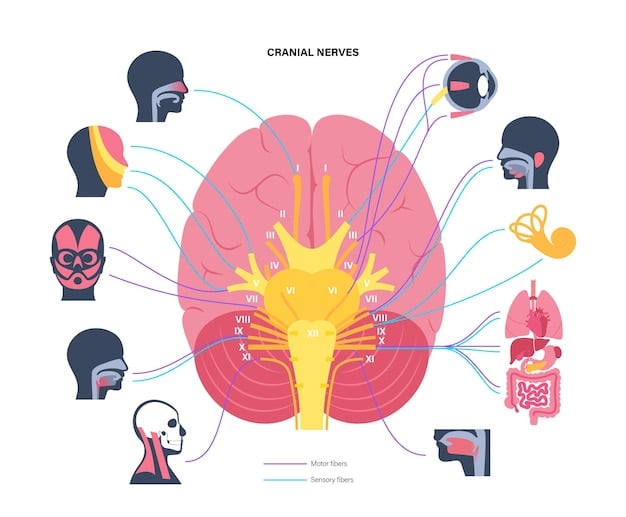The Truth About Testosterone and Mental Health in 2025

The Truth About Testosterone and Mental Health: Separating Fact from Fiction in 2025 requires examining the multifaceted relationship between testosterone levels and their impact on men’s mental well-being, particularly concerning mood disorders, cognitive functions, and overall psychological health.
The intricate dance between hormones and mental health has always been a topic of great interest and debate. Among the hormones, testosterone stands out, especially when considering men’s mental well-being. The Truth About Testosterone and Mental Health: Separating Fact from Fiction in 2025 is crucial, as outdated beliefs and misinformation can significantly impact how men perceive and address their mental health concerns.
Let’s dive into the facts, debunk myths, and explore what we can expect in 2025 regarding the relationship between testosterone and men’s mental health. What does the latest research reveal, and how can this knowledge empower men to lead healthier, more balanced lives? Join us as we navigate this complex landscape.
Understanding the Basics: Testosterone and Its Role
Testosterone, often hailed as the primary male sex hormone, plays a vital role in various bodily functions. Beyond its association with muscle mass and libido, testosterone significantly influences mood, cognitive function, and overall mental well-being. Let’s break down the core aspects of testosterone and its broader impact.
The Physiological Functions of Testosterone
Testosterone is crucial for maintaining muscle mass, bone density, and red blood cell production. It supports libido and sexual function and plays a part in energy levels and overall vitality. Understanding these physiological roles is essential for appreciating how imbalances can affect mental health.
Testosterone’s Impact on Brain Function
The brain is a complex organ heavily influenced by hormones. Testosterone interacts with neurotransmitter systems, affecting mood regulation, cognitive processes, and even behavior. By understanding these interactions, we can better grasp the connection between testosterone levels and mental health conditions.
- Mood Regulation: Testosterone influences the production and regulation of neurotransmitters like serotonin and dopamine, which are vital for mood stability.
- Cognitive Function: Optimal testosterone levels arelinked to improved cognitive performance, including memory and focus.
- Neuroprotection: Research suggests testosterone may have neuroprotective properties, safeguarding against cognitive decline.
In conclusion, testosterone’s role extends far beyond physical attributes, impacting brain function and mental well-being in significant ways. Recognizing this broad influence is crucial for addressing men’s health holistically. The Truth About Testosterone and Mental Health: Separating Fact from Fiction in 2025 hinges on dispelling myths and understanding the comprehensive role of this hormone.
Testosterone and Mood Disorders: What’s the Link?
The connection between testosterone and mood disorders is a complex one, with studies suggesting that low testosterone levels may contribute to symptoms of depression and anxiety in men. However, it’s important to understand the nuances and avoid oversimplifications. Let’s examine the relationship between testosterone and common mood disorders.
Testosterone and Depression
Research indicates that men with lower testosterone levels are more likely to experience depressive symptoms. Testosterone replacement therapy (TRT) has been explored as a potential treatment for depression in hypogonadal men, with some studies showing promising results. However, it’s not a one-size-fits-all solution.
Testosterone and Anxiety
While not as direct as the link with depression, fluctuations in testosterone levels can also affect anxiety. Some men may experience increased anxiety with low testosterone, while others might feel anxious due to the side effects of TRT. More research is needed to fully understand this relationship.

- Complex Interactions: The relationship between testosterone and mood is influenced by various factors, including age, lifestyle, and co-existing health conditions.
- Individual Variability: Not all men with low testosterone will experience mood disorders, and vice versa. Individual responses vary significantly.
- Holistic Approach: Addressing mood disorders requires a comprehensive approach, including lifestyle modifications, therapy, and medical interventions when necessary.
Overall, the connection between testosterone and mood disorders is intricate and influenced by numerous factors. While low testosterone may contribute to depressive and anxiety symptoms, it’s crucial to consider individual circumstances and adopt a holistic approach to treatment. Understanding The Truth About Testosterone and Mental Health: Separating Fact from Fiction in 2025 requires a nuanced perspective that acknowledges the complexity of this relationship.
Debunking Myths: Common Misconceptions About Testosterone
Numerous myths and misconceptions surround testosterone, often leading to confusion and misinformation. Separating fact from fiction is essential for promoting a clear understanding of the hormone’s role in men’s health. Let’s debunk some common myths about testosterone.
Myth 1: Testosterone is Only About Muscle Mass and Libido
While testosterone is crucial for muscle mass and sexual function, its influence extends far beyond these aspects. It affects mood, cognitive function, bone density, and overall energy levels. Reducing testosterone to just muscle and libido overlooks its comprehensive impact on men’s health.
Myth 2: TRT is a Quick Fix for All Men’s Health Issues
Testosterone replacement therapy (TRT) is not a universal solution for all men’s health concerns. While it can be effective for men with clinically low testosterone levels, it’s not appropriate for everyone. TRT carries potential risks and side effects and should be considered under medical supervision.

Myth 3: High Testosterone Levels Always Mean Better Health
While adequate testosterone levels are essential for health, excessively high levels can also be problematic. High testosterone can lead to adverse effects like acne, aggression, and cardiovascular issues. Balance is key, and maintaining testosterone within a healthy range is crucial.
- Informed Decisions: Understanding the facts about testosterone empowers men to make informed decisions about their health.
- Medical Supervision: Any intervention related to testosterone levels should be done under the guidance of a healthcare professional.
- Holistic Perspective: Mental and physical health are interconnected, and testosterone is just one piece of the puzzle.
In summary, dispelling myths about testosterone is crucial for fostering a realistic and informed perspective on men’s health. By separating fact from fiction, men can make better decisions and seek appropriate medical guidance when needed. Discovering The Truth About Testosterone and Mental Health: Separating Fact from Fiction in 2025 involves clearing up misinformation and embracing a holistic understanding.
Lifestyle Factors: How to Naturally Support Healthy Testosterone Levels
While medical interventions like TRT can be helpful in some cases, lifestyle factors play a significant role in supporting healthy testosterone levels naturally. Diet, exercise, sleep, and stress management can all impact testosterone production and overall well-being. Let’s explore these lifestyle factors.
Diet and Nutrition
A balanced diet rich in essential nutrients is vital for hormone production. Incorporating healthy fats, proteins, and complex carbohydrates can support testosterone levels. Nutrient deficiencies, such as zinc and vitamin D, can negatively impact testosterone production.
Exercise and Physical Activity
Regular physical activity, particularly resistance training, has been shown to boost testosterone levels. Combining strength training with cardiovascular exercise can offer the most benefits. However, excessive endurance exercise may have the opposite effect.
Prioritizing Sleep
Adequate sleep is crucial for hormone regulation. Lack of sleep can disrupt testosterone production and increase stress hormones like cortisol. Aim for 7-9 hours of quality sleep each night to support healthy testosterone levels.
Stress Management
Chronic stress can elevate cortisol levels, which can interfere with testosterone production. Practicing stress management techniques like meditation, yoga, and deep breathing exercises can help maintain hormonal balance.
- Consistency is Key: Implementing these lifestyle changes consistently yields the best results over time.
- Individualized Approach: What works for one person may not work for another. Tailor your lifestyle to meet your individual needs and preferences.
- Professional Guidance: Consult with a healthcare provider or nutritionist for personalized advice on supporting healthy testosterone levels.
In conclusion, adopting a healthy lifestyle is a powerful way to support testosterone levels naturally. By focusing on diet, exercise, sleep, and stress management, men can optimize their hormonal health and overall well-being. Understanding The Truth About Testosterone and Mental Health: Separating Fact from Fiction in 2025 includes recognizing the importance of these lifestyle factors.
The Future of Research: What to Expect in 2025 and Beyond
As we look ahead to 2025 and beyond, ongoing research promises to provide deeper insights into the relationship between testosterone and men’s mental health. Advances in medical science and technology are paving the way for more effective diagnostic tools and personalized treatment strategies. Let’s explore what we can expect in the coming years.
Advancements in Diagnostic Tools
Improved diagnostic methods will allow for more accurate assessment of testosterone levels and their impact on mental health. Advanced blood tests and imaging techniques may provide a more comprehensive understanding of hormonal imbalances and their effects on mood and cognition.
Personalized Treatment Strategies
The future holds personalized treatment approaches tailored to individual needs and genetic predispositions. Pharmacogenomics, the study of how genes affect a person’s response to drugs, may play a role in optimizing TRT and other hormone-related therapies. The promise of tailored treatments aims to maximize effectiveness and minimize side effects, aligning with The Truth About Testosterone and Mental Health: Separating Fact from Fiction in 2025.
The Role of Technology
Telemedicine and digital health technologies will make it easier for men to access hormone-related care. Remote monitoring devices and telehealth consultations can improve convenience and accessibility, particularly for those in rural areas or with limited mobility.
- Holistic Integration: The future of testosterone and mental health research will likely emphasize a holistic approach, integrating medical, psychological, and lifestyle interventions.
- Longitudinal Studies: Ongoing longitudinal studies will provide valuable data on the long-term effects of testosterone imbalances and treatments.
- Collaborative Efforts: Collaboration between researchers, healthcare providers, and technology developers will drive innovation in the field.
The future of research on testosterone and men’s mental health holds great promise. With advancements in diagnostic tools, personalized treatments, and technology, we can anticipate more effective and accessible care for men in the years to come. As we approach 2025, staying informed about these developments is critical for navigating The Truth About Testosterone and Mental Health: Separating Fact from Fiction in 2025.
| Key Point | Brief Description |
|---|---|
| 💪 Testosterone’s Role | Affects mood, cognition, and physical health. |
| 🧠 Mood Disorders Link | Low T linked to depression and anxiety symptoms. |
| 🌿 Lifestyle Impact | Diet, exercise, sleep, stress affect T levels. |
Frequently Asked Questions
Low testosterone can contribute to symptoms of depression, anxiety, and fatigue, affecting overall mental well-being. It can also impair cognitive functions such as memory and focus.
TRT can be safe for some men, but it’s essential to consult with a healthcare provider to assess the risks and benefits. Potential side effects include acne, sleep apnea, and an increased risk of blood clots.
Lifestyle changes like regular exercise, a balanced diet, adequate sleep, and stress management can help boost testosterone levels naturally. However, it’s essential to approach these changes consistently.
Yes, excessively high testosterone levels can lead to adverse effects like acne, aggression, and cardiovascular issues. Maintaining testosterone within a healthy range is crucial for overall well-being.
Future research will focus on personalized treatment strategies, improved diagnostic tools, and the integration of telemedicine. The Truth About Testosterone and Mental Health: Separating Fact from Fiction in 2025 will likely involve more holistic approaches to care.
Conclusion
In conclusion, understanding The Truth About Testosterone and Mental Health: Separating Fact from Fiction in 2025 involves dispelling myths, recognizing the hormone’s comprehensive role, and embracing holistic approaches to care. Lifestyle factors play a significant role in supporting healthy testosterone levels and overall well-being.
As we look to the future, ongoing research promises to provide deeper insights and more effective treatment strategies for men’s mental health. By staying informed and seeking appropriate medical guidance, men can lead healthier, more balanced lives.





